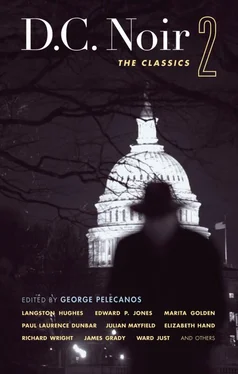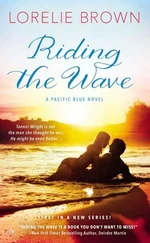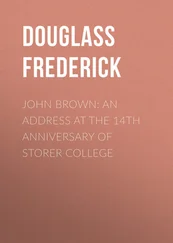Teeny said, “Man, ain’t this something. Those guys done caught us off guard.”
Obviously the 15th and H boys had felt so good about the German beating Joe that they had decided to pay us a surprise visit, something they had never dared before. They were dancing and yelling like Indians in the middle of Duncan Street, and throwing bricks and milk bottles at everything that moved. Then our parents started opening windows to see what all the noise was about, and the light from the houses poured down into the street. The victorious invaders hauled tail for their own territory, disappearing as suddenly as they had come.
We crawled out of our shelters and gathered under the shattered lamplight. You can imagine how we felt. It wasn’t so much my shoulder or Robert Jackson’s bleeding (his hand had been cut) or Austin’s crying (he had lost another tooth). The hurt was deeper than that.
“Ira! Ira!” It was Teeny Mae’s father calling him. “You out there, boy?”
Teeny looked up. “Yes sir, I’m here.”
“What are you boys doing out there? What happened to that lamplight?”
Teeny didn’t know what to say, and the rest of us could not help him. We just stood there with our heads bowed.
“Well, speak up, boys. What happened?”
We didn’t know, not really. After that night we had our victories, especially after Joe became champ and gave Schmeling a good licking. But the spirit was never quite the same on Duncan Street. We were never so sure again.
Washington
by Julian Mazor
(Originally published in 1963)
Shaw
When I ran through Pennsylvania Station on a cloudy November afternoon, I was wearing a clean blue shirt with a soft unbuttoned collar, a brown knit tie, a brown herringbone suit, well-polished brown Spanish shoes, and an English overcoat — a gray herringbone — that I had worn for three years. I had some old letters stuffed into the inside pocket of my jacket, and after I had taken out my wallet to buy my train ticket I had trouble putting it back. I was afraid I would miss my train, so I slipped the wallet into the inside pocket of my overcoat, thinking I would sort things out when I was aboard. I had a hundred and forty-seven dollars in the wallet, a sum left over from my last pay check, and I was on my way to Washington, D.C., to see my family — my mother and father and an older sister who had recently got married. I had just left my job as a salesman-demonstrator-instructor in the tennis department of a famous New York department store, where I, John Lionel, was known as “Wright & Ditson.” One day, for some reason, while demonstrating the proper service technique to a twelve-year-old boy and his mother, I tossed a tennis ball up in the air and hit a powerful cannonball service; the ball whizzed by the floor manager’s — Mr. Palmerston’s — ear, and smashed a glass case. Palmerston said it was nice knowing me and told me to pick up my check. So long, Wright & Ditson. It was my third job since coming back from Europe, where I had served a tour in the Army, and although in a way I was a little concerned because I didn’t seem to be going anywhere and didn’t know where I wanted to go, I thought, Well, I’m only twenty-three and I’ve got time.
Somewhere near North Philadelphia, I ate a tuna-fish sandwich that I bought from a vender on the train, and about twenty minutes south of the Thirtieth Street Station I began to feel warm and a little strange. I thought I’d get some air, so I left my seat and went out to the platform between the cars. I leaned against the steel wall and smoked and looked out at the countryside. The cool air made me feel a lot better. I stayed out between the cars until the train was about a half hour past Wilmington, and then I returned to my seat in the coach.
I thought I’d get a book out of my suitcase and read for a while. When I looked up at the baggage rack, I saw that my overcoat was gone. I had forgotten to take the wallet out of it. I had placed the coat neatly folded over my suitcase, and there was no doubt that it was gone. I walked up and down the coach, looking at all the overcoats in the baggage racks, and then I returned to my seat and tried to be calm and think things out. Then I went up and down the car again. When I returned to my seat for the second time, feeling demoralized and enraged, a man sitting across the aisle asked me what was the matter, and I told him that my overcoat was gone. The man folded his newspaper and looked out the window for a while, and then he asked me to describe the coat. I told him that it was a gray herringbone, and that it had been on the rack above my seat. He took a deep breath and let it out slowly, and then, seeming embarrassed, he told me that he had seen a man pull my coat from the rack as the train got into Wilmington, and that he had, even then, found it a little strange, because this man was already wearing a camel’s-hair coat.
I slumped down in my seat, feeling sick. I always do when somebody steals from me. For a while, I sat there thinking about my overcoat and how it had been part of the friendly continuity of my life. Then I got to my feet and went through my pockets and came up with fifty cents. I had lost my money, my Social Security card, and even my passport. I began to feel cold and hot alternately, and around Aberdeen I began to feel cramps and nausea. I figured it was the tuna-fish sandwich. Just outside of Baltimore, I became desperately sick and went to the men’s room and threw up. I was sick again between Baltimore and Washington, and when the train finally pulled into Union Station and I stepped out into the cold, rainy afternoon, I felt like hell.
I didn’t have enough money for a cab, and it was no use calling home. My family was out of town, visiting my sister’s husband’s family in Maryland. They would be coming back to Washington in the morning. So I got on a bus, and about twenty minutes later got off, in the rain, and transferred to another bus. While I was on the bus, the nausea and cramps came back and I decided I’d have to get off. I began to look for a bar or restaurant or hotel along the way, and when I saw a gasoline station in a very old, shabby neighborhood — a Negro neighborhood — I pulled the cord and picked up my suitcase and got off.
In the men’s room of the gasoline station, I bathed my face in cold water, and went outside again. I was feeling much better, but weak. The rain was cold, and the wind had grown stronger, and I was shivering. I was about to cross the street and wait by a little yellow bus-stop sign, when I saw that I was in front of a small grocery store with a green awning slanting down over a dimly lighted display window. I decided to stand under the awning and watch for the bus from there.
Inside the grocery store, three Negroes were leaning against a long, white refrigerated case, or counter, talking and laughing. Another Negro, in a white apron, was behind the counter, leaning on it and reading a newspaper and eating a sandwich. I thought of going into the store and getting warm, but I had no excuse for going in, really — no money to buy anything with. So I stayed under the awning, which was flapping wildly in the wind. My teeth were chattering, and I felt a sore throat coming on, when I saw a Negro man and woman walking down the street in the rain, arguing. They’d walk without speaking, then stop and argue, then walk some more. Actually, it was more of a dramatic exercise than an argument. The woman would make wordless faces at the man, which unsettled him. He would get ready to say something, and then she would laugh at him. Then he would look surprised and cautious, as though he was searching for a little balance and leverage, and she would scream at him. Then she would tell him to shut up, and he would look surprised, and finally he would begin to scream at her, and then she would begin to laugh at him, which made him more unsteady. The man was squat and round, with a black moonface crowned by a porkpie hat. He was wearing a frayed and very wet fatigue jacket. His companion was mocha brown, and tall and wide. She was large-boned and hefty, but not fat, and although she was obviously strong, she was unmistakably feminine. She wore a man’s raincoat and a pair of bedroom slippers without backs. She didn’t wear stockings, and she didn’t wear a hat. She had a wide nose and a wide mouth, and large, beautiful eyes. She walked ahead of the man into the grocery store, slamming the door after her, and he followed her in, looking worried and confused.
Читать дальше











